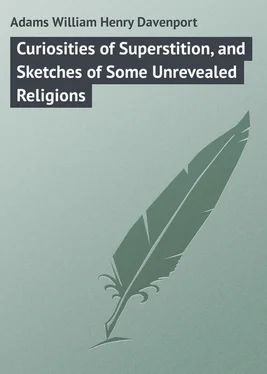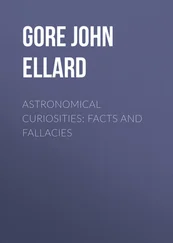William Adams - Curiosities of Superstition, and Sketches of Some Unrevealed Religions
Здесь есть возможность читать онлайн «William Adams - Curiosities of Superstition, and Sketches of Some Unrevealed Religions» — ознакомительный отрывок электронной книги совершенно бесплатно, а после прочтения отрывка купить полную версию. В некоторых случаях можно слушать аудио, скачать через торрент в формате fb2 и присутствует краткое содержание. Жанр: foreign_language, foreign_prose, на английском языке. Описание произведения, (предисловие) а так же отзывы посетителей доступны на портале библиотеки ЛибКат.
- Название:Curiosities of Superstition, and Sketches of Some Unrevealed Religions
- Автор:
- Жанр:
- Год:неизвестен
- ISBN:нет данных
- Рейтинг книги:4 / 5. Голосов: 1
-
Избранное:Добавить в избранное
- Отзывы:
-
Ваша оценка:
- 80
- 1
- 2
- 3
- 4
- 5
Curiosities of Superstition, and Sketches of Some Unrevealed Religions: краткое содержание, описание и аннотация
Предлагаем к чтению аннотацию, описание, краткое содержание или предисловие (зависит от того, что написал сам автор книги «Curiosities of Superstition, and Sketches of Some Unrevealed Religions»). Если вы не нашли необходимую информацию о книге — напишите в комментариях, мы постараемся отыскать её.
Curiosities of Superstition, and Sketches of Some Unrevealed Religions — читать онлайн ознакомительный отрывок
Ниже представлен текст книги, разбитый по страницам. Система сохранения места последней прочитанной страницы, позволяет с удобством читать онлайн бесплатно книгу «Curiosities of Superstition, and Sketches of Some Unrevealed Religions», без необходимости каждый раз заново искать на чём Вы остановились. Поставьте закладку, и сможете в любой момент перейти на страницу, на которой закончили чтение.
Интервал:
Закладка:
His happiness, like His holiness, is without spot or blemish; every blessing is His that man can imagine – health and wealth, virtue, wisdom, prosperity, immortality; and these blessings He is willing to bestow on His creatures if in thought and word and deed they eschew impurity. But we nowhere read that He will assist them in the struggle against sin by creating in them a new heart, or by vouchsafing the grace of His Holy Spirit. The mystery of the Atonement was beyond the reach of the soul and intellect even of Zarathustra; and the highest conception of God to which he could attain was that of a Being of perfect Goodness, sitting enthroned in a strange awful loneliness, with no other feeling than that of approval of Good and disapproval of Evil. He is, of course, the supreme type of Power: all that is flows from Him, as light from the Sun: He creates both the shadow and the brightness of the human existence, good and ill, fortune and misfortune. So far above all human intelligence is He placed, that images of Him are forbidden, though He is understood to be symbolised by the sun and by fire. He can be served only by prayers and offerings, by a life of purity and truth, by abstinence from sinful passions, by the banishment of sinful thoughts. Thus Herodotus says of the Zarathustrians, that they reject the use of temples, of altars, and of statues. “They smile,” he says, “at the folly of those nations who imagine that the Gods are descended from, or have any affinity with, human nature. The loftiest mountain-tops are the places chosen for their sacrifices. Hymns and prayers are their principal forms of worship. And the Supreme God, who fills the vast sphere of Heaven, is the object to whom they are addressed.”
The service of Ahura-Mazda consisted, then, as we see, in the performance of good works, in the cultivation of virtue, and in the due offering up of prayer and praise. It was an intellectual worship that Zarathustra prescribed; a worship that might assist in the development of a high morality, but could not inculcate a deep and true religious feeling. Of contrition for sin, of humbling oneself before God, of self-sacrifice and self-abnegation, of love, and faith, and hope, the creed of Zarathustra took no account. And here, as well as elsewhere, we observe its vast inferiority to the religion of Christ. It made no provision for the awakening and fostering of those tender emotions of profound humility, thankful adoration, and unutterable gratitude which are awakened in the Christian’s heart by the name of Jesus. It could never have called forth such an utterance of the son’s glad submission to the will of the Father as we find, for example, in the ejaculatory verse of Ben Jonson:
“Hear me, O God!
A broken heart
Is my best part:
Use still Thy rod,
That I may prove
Therein Thy love.
“If Thou hadst not
Been stern to me,
But left me free,
I had forgot
Myself and Thee.
“For sin’s so sweet,
As minds ill-bent
Rarely repent,
Until they meet
Their punishment.”
Such lines as these indicate a relation between man and his God which could never obtain between the Zarathustrian and his Ahura-Mazda. His was a cold, unimpassioned, logical creed, warmed by no single heart-throb of Divine love and mercy; a creed which demanded human worship for a sinless God, but did not invite human faith in a loving Redeemer; and, consequently, a creed which left untouched the deepest springs and most responsive chords of our humanity.
Both the excellencies and the short-comings of Magianism are shown in the confessions and prayers included in the Zendavesta. For example, there is much that is elevated and noble in the following, yet its tone is curiously Pharisaical, and may be contrasted with that of Ben Jonson’s verses. Instead of being the aspiration of a sinful soul after forgiveness, and a reaching forth towards love and light, it is the self-eulogium of a mind confident in its own sustaining power, and to appreciate its weakness we need only to contrast it with the fervour of a David or a S. Paul. We remember that the Hebrew king exclaimed: “My heart panteth, my strength faileth me: as for the light of mine eyes, it also is gone from me,” and how the Apostle confessed himself “the chief of sinners.” With no such aching consciousness of weakness does the Zarathustrian bow himself before God. There is all the pride of self-righteousness in his prayer. Thus:
“I remain standing fast in the statutes of the law which Ahura-Mazda gave to Zarathustra. As long as life endures I will stand fast in good thoughts in my soul, in good words in my speech, in good deeds in my actions. With all good am I in harmony, with all evil am I at variance. With the punishments of the future life I am content. I have taken hold of good thoughts, words, and works. I have forsaken evil thoughts, words, and works. May the power of Ahriman be broken! may the reign of Ahura-Mazda increase!”
And again:
“I am steadfast in this faith, and turn myself not away from it, for the sake of a happy life, or for the sake of a longer life, nor for power, nor for a kingdom. If I must give up my body for the sake of my soul, I give it willingly. I believe firmly in the good Mazda-yusaian faith; in the Resurrection; in the bridge of souls, 20 20 The bridge Chinavat by which the souls of the good crossed into Paradise; a fancy afterwards adopted by Muhámad.
in the invariable reward of good deeds and punishment of bad deeds, in the everlasting continuance of paradise and the annihilation of hell; and I believe that, at the last, Ahura-Mazda will be victorious, and Ahrimanes will perish with the Devs, and all the children of darkness… I am full of hope that I shall attain to Paradise and the shining Garathânan, where all majesty dwelleth. I make this confession in the hope that I may hereafter become more zealous to accomplish good works and keep myself more from sin; and that my good deeds may serve for the diminution of evil and the increase of good till the rising again.”
We know the form of prayer taught us by Jesus Christ; how simple it is, how complete, how absolute in its renunciation of self, how comprehensive in its charity. “Thy will be done”… “Forgive us our trespasses as we forgive them who trespass against us”… “Lead us not into temptation.” Such are its leading thoughts: submission before God, charity before Man; both implying and demanding the conquest and humiliation of self. Let us contrast it with a Zarathustrian prayer:
“In the name of God the Giver and Forgiver, Rich in Love, praise be to Ahura-Mazda, the God with the name … ‘Who always was, always is, and always will be.’… Ahura-Mazda the Wise, the Creator, the Over-seeing God, pure, good, and just! With all strength bring I thank-offerings and praise to the Lord, the completer of good works, who made men greater than all earthly beings, and through the gift of speech created them to rule over the creatures and to war against the evil spirits. Praise to the omniscience of God who has sent through the holy Zarathustra power and knowledge of the law. All good do I accept at Thy command, O God, and think, speak, and do it. I believe in the pure law, and by every good work I seek forgiveness for sins. I keep pure the six powers – thought, speech, act, memory, reason, understanding. According to Thy will am I able to fulfil (these resolutions.) O Accomplisher of Good, to Thy honour are good thoughts, good words, and good works. I enter on the shining way to Paradise. May the terror of hell not overcome me! May I pass the bridge Chinavat and attain to Paradise, the bright and odoriferous, where are all joys. Praise to the Lord who awards those who accomplish good deeds according to His will, who purifies the obedient, and at last purifies the wicked in hell. All praise be to the Creator, Ahura-Mazda, the All-Wise, the Mighty, the Rich in Love.”
Читать дальшеИнтервал:
Закладка:
Похожие книги на «Curiosities of Superstition, and Sketches of Some Unrevealed Religions»
Представляем Вашему вниманию похожие книги на «Curiosities of Superstition, and Sketches of Some Unrevealed Religions» списком для выбора. Мы отобрали схожую по названию и смыслу литературу в надежде предоставить читателям больше вариантов отыскать новые, интересные, ещё непрочитанные произведения.
Обсуждение, отзывы о книге «Curiosities of Superstition, and Sketches of Some Unrevealed Religions» и просто собственные мнения читателей. Оставьте ваши комментарии, напишите, что Вы думаете о произведении, его смысле или главных героях. Укажите что конкретно понравилось, а что нет, и почему Вы так считаете.












